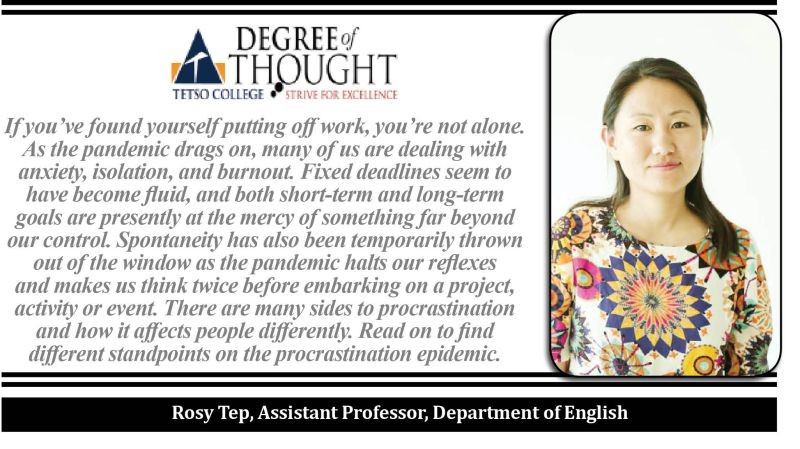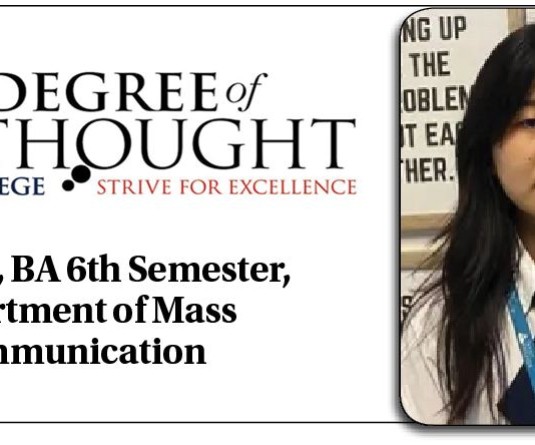
In the facade of a global pandemic, we may find ourselves speculating, “Why bother scheduling for anything anyway?" It has escalated to the withdrawal of countless professions, positions, convocations, conferences, trips, shows, festivals, anniversaries etc. Fixed deadlines have become unpredictable, and both short-term and long-term goals are presently at the mercy of something far beyond our control. Yet, this very mindset is the nub of the coronavirus procrastination. Unexpectedly, academic learners are on a hike procrastinating, putting off starting or finishing a task despite knowing that it will seriously compromise the quality of their work. There is no urgency in life anymore; no one expects anything from anyone and you have nowhere to go. The irony is we have plenty of time procrastinating and some of us can be potentially fit to be entitled as professional procrastinators.
Unsurprisingly, many of us are enduring a high stage of stress due to anxiety about the state of the world, social isolation, additional responsibilities, or dealing with illness and loss. We are not alone in the so-called procrastination epidemic; it has, however, taught us about pausing the machine of life. With everyone jammed at home and the realm apparently in a state of relentless chaos, it becomes challenging to believe that we are, in fact, still moving towards our goals.
We try to do many tasks at a time and squeeze in 'in-between’ activities wherever we can because every single day we make a choice. Today, anxiety is no doubt on the rise, making the demands of work feel secondary to the issues weighing on people’s minds. As the pandemic trails on what most of us expected, many are finding it hard to get things done. Early on, we expected extra time to do home projects, activities, or other things.. Instead, we are dealing with angst, loneliness, and burnout. It's essential to understand that procrastination doesn't associate with laziness or other character flaws. What’s different in our pandemic reality is that even non-work-related stress could cause procrastination. In most cases, our brain activates by prioritizing urgent tasks at the beginning of the day and can sail through some easier work on cruise control in the afternoon.
Are we tackling our to-do lists? Many of us had high hopes to read more books, grab behind hand home projects, and make use of free changing time to get ahead at work. But it hasn’t essentially turned out that way. People are realizing this isn’t the abundance of time and space originally believed; even small tasks, which seemed easily accomplishable before, are becoming tough to check off the list; so, what hope is there for combating putting off tasks as social distancing drags on? It comes down to thinking about why we procrastinate and how this fits into the current situation.
Each day, we are dealing with many new distractions. One reason we are procrastinating more is the variety of distractions in a homework environment; one may face low motivation when they consider what issues they want to highlight now, especially in the nonexistence of a clear track ahead. Oftentimes, this feeling is a result of overvaluing how many tasks we have the bandwidth to complete. Virtual interactions may feel unnatural and less emotionally responsive than in-person interactions once were, leading people to look elsewhere in their lives to find a value like how it used to be in a workplace, social relationships, and impact feelings of belonging, identification, and satisfaction at work.
My interest in procrastination grew and led me to question few people with an edge over procrastination enabling them to push things at the forefront of their minds, learn new skills, increase attention to detail, gain better tools to do the task at hand, and come up with new and more creative approaches. However, on the flip side, one could also be seen as oblivious to human connection in their single minded focus to accomplish tasks, thereby affecting how people saw and branded them. In other words, some may view procrastination and overcoming it as a double-edged sword.
As I question these findings, competition is actually a key feature for non-procrastinators. They enjoy the competition and are driven by outdoing their peers which explains why non-procrastinators are more motivated than procrastinators because procrastinators could be, in my opinion, more concerned with how people will view them. They can be quite apprehensive with their social image.
In a world where so much is out of our control, committing to a routine is a way of creating and reminding ourselves of our own power. Without a disciplined schedule, procrastination inescapably moves in with all the chaos, smugness, and confusion. We must not get carried away by the paralyzing angst and instead focus on what is actually in our power - our behavior and the way we manage our time. To combat procrastination is simply starting a task, even if it is during a short period, or if everything we will do for that day – even if it is during a pandemic or not, the choice lies on us. Technological advances, changes in the workplace, and the evolution of family or home life cannot manage to start an action, while we often ask ourselves, “What is the amount of time I am currently driven or ready to commit to this task without postponing it? Once we have set a time limit, we can start the task without dreading it so much. If we feel motivated to continue working once the time limit we had initially set finishes, we may do so. Consider limiting our time online to reduce anxiety when we are all burnout; as it helps to acknowledge why we procrastinate.
Let's think through questioning ourselves, whether the year 2020 has made successful aging for each of us? Because a year from now, we may wish we had started that day or are we still to blame the pandemic for our procrastination problem?
Degree of Thought is a weekly community column initiated by Tetso College in partnership with The Morung Express. Degree of Thought will delve into the social, cultural, political and educational issues around us. The views expressed here do not reflect the opinion of the institution. Tetso College is a NAAC Accredited UGC recognised Commerce and Arts College. The editors are Dr Hewasa Lorin, Dr Aniruddha Babar, Nisha Dahiya and Meren. For feedback or comments please email: dot@tetsocollege.org






